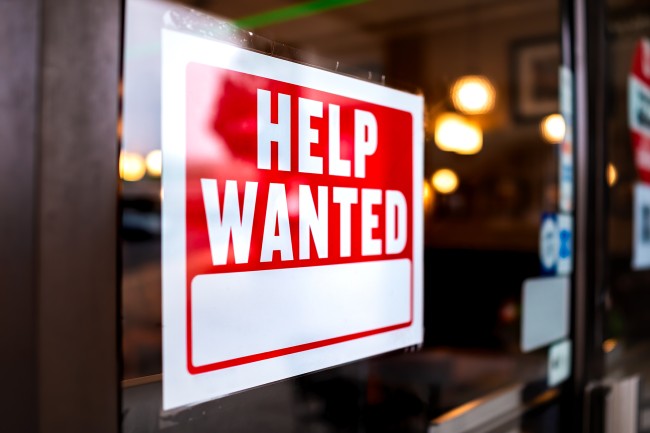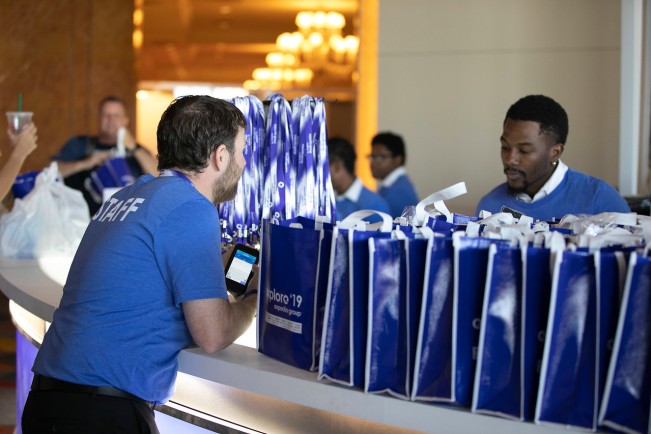
Even after nearly two years, everyone’s lives are still being impacted by COVID in some way, and the events industry is no exception. While we as an industry are incredibly proud of the progress we have made during this time and of all of the innovations that have emerged due to this crisis, there are still aspects of this pandemic that are altering how we see events today. Though nothing could stop our industry from moving forward, there are obstacles created by COVID that have changed the landscape and altered certain aspects of meetings and events. Read on to learn the changes to the industry that you need to keep in mind when planning your next event.
Corporate Events and Event Staffing
One element of corporate event planning that many seem to overlook, mostly because it goes unnoticed when done well, is staffing. The same is likely true for your favorite stores and restaurants. Without a labor shortage, the level of attention and care you receive is unremarkable to most people (though many do notice stellar service). However, effectively and efficiently running any event takes labor—and that’s just for the basics. Truly wowing guests requires even more time and labor.
Across a wide variety of hospitality and service industry businesses, employees have been hard to come by. Dubbed “The Great Attrition,” an estimated 47% of hospitality workers have either quit or are expected to within the next 6 months. Due to this, it should come as no surprise that the events industry (which goes well beyond event planners) is being impacted by the labor shortages. But exactly how big is that impact and what does it mean for in-person events and meetings for 2022?
First, let’s consider your venue. Whether it’s at a hotel or convention center, there’s a variety of staff needed, and let’s be honest, they’re struggling to fill gaps. Everything from the front desk to cleaning and wait staff, experienced hospitality workers are difficult to come by.
Similarly, wait and kitchen staff at restaurants that may have previously hosted your events are in short supply as well. When coupled with overworked managers who can’t find people to hire, the impact is being felt across the industry. Further, it’s anticipated that many of these workers may not return, forcing hospitality and leisure industries to reflect in the same way many workers have.
So what does that mean for events?

Impact of Labor Shortages on the Events Industry
As you can imagine, labor shortages in hospitality and leisure industries have had an impact on events. The events industry itself saw a decrease in workers when events were cancelled during the beginning of the pandemic, thus causing many to seek work elsewhere. Further, with the adoption of virtual and hybrid events, event planning became a different industry than the one that initially attracted event professionals and made them feel passionate about planning. However, some very real impacts will be felt by those planning events, especially in early 2022 as it is likely that labor shortages will continue.
1. Increased venue/labor costs
Increased demand with limited options means rental, catering, and all associated costs with event venues will likely increase. Further, some venues may have additional staffing charges, so they can hire temporary workers to service your event.
2. Decreased services
Especially when it comes to hotels, guests may experience decreased services. For example, many hotels cut back on housekeeping services to save costs and manage staffing shortages. That means rooms may not be cleaned daily, towels may have to be picked up at the front desk, and other housekeeping services may be limited.
3. Increased production costs
If you’ve decided to go hybrid to accommodate guests who may not feel comfortable with live events yet, you will incur associated production costs, such as audio-visual equipment and technology to support live streams and other tech features necessary to host a hybrid program.
4. Travel and accommodation costs
Increased demand, labor shortages, pressure to make up for lost revenue, higher salaries, and increased costs of goods and services to support daily operations means air travel and room rentals have gone up. If you’re planning on housing guests, VIPs, speakers, or anyone else, expect costs to go up in this area as well.
5. Increased tech and safety costs
The arrival of COVID pushed us into a world that is far more hands-free. For event planners and hosts, that means not only technology that supports hands-free payments, entries, and interactions but also technology that supports social distancing and COVID mitigation techniques. 
In short, those hoping to continue hosting events while COVID-19 still impacts our daily lives will want to plan accordingly. From increased costs to decreased services, managing your expectations as well as those of your guests will become key. However, studies suggest there are ways to mitigate potential negative attendee perception based on limited or decreased services attributable to the labor shortage.
While there are certainly challenges to event planning and hosting in the midst of a pandemic that goes through surges, there are ways to mitigate and overcome those challenges by being prepared and understanding the landscape.
Further, the assistance of an event planning company—one with considerable experience and expertise in handling everything from venues and travel to hybrid and virtual events—can be invaluable. If you’re ready to talk about your event goals for 2022 and how you can best prepare to amaze your guests, get in touch with the Bishop-McCann team today! 
